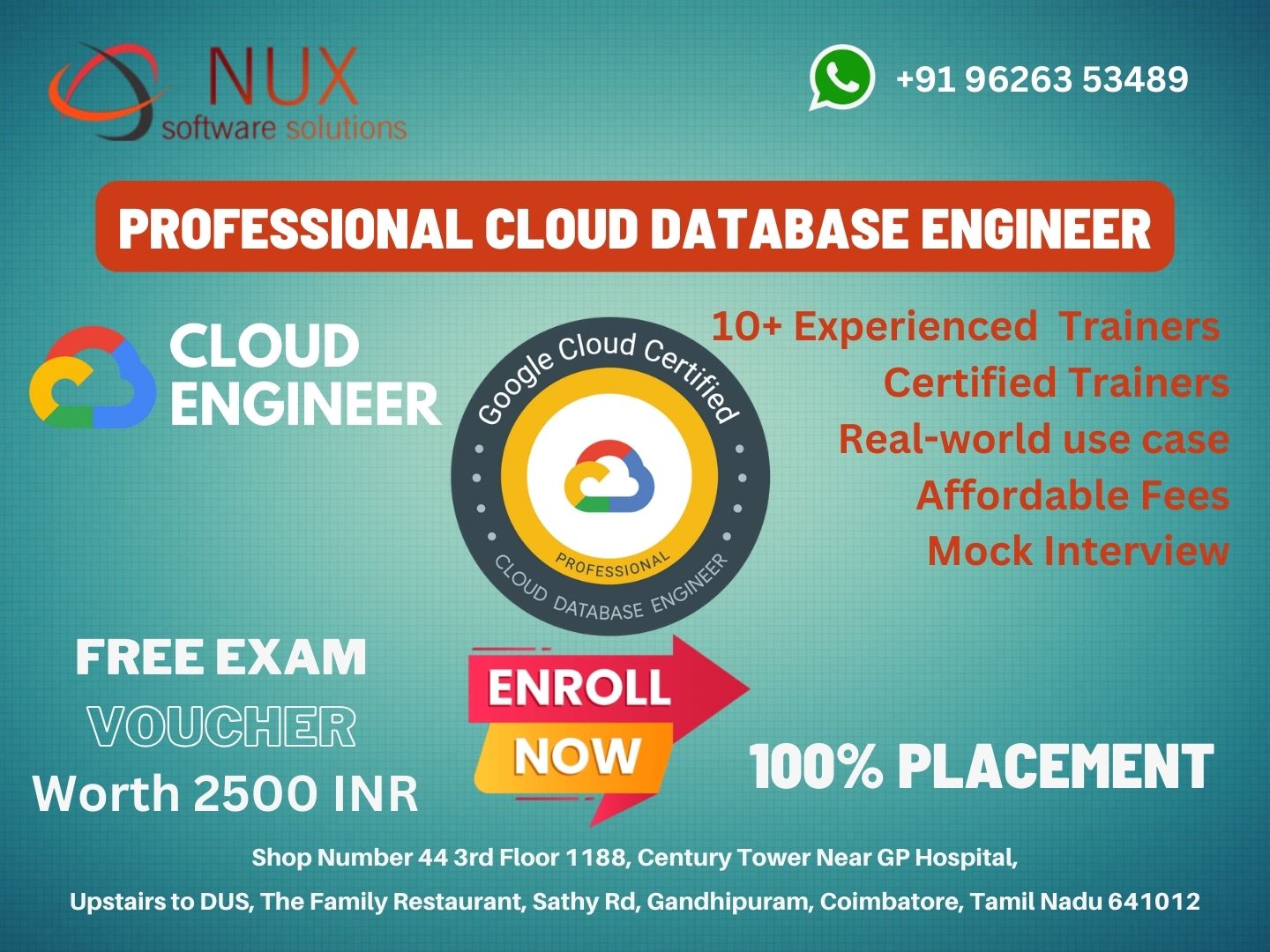Professional Cloud Database Engineer


Nux Software Training & Certification Solutions in Coimbatore offers top-notch training courses for aspiring Professional Cloud Database Engineers. Our advanced programs, led by industry-expert trainers, provide an exceptional learning experience in a state-of-the-art training center. With 24/7 lab access from anywhere, our training is both convenient and flexible.
Our international expert trainers bring real-time industry experience to enhance the educational value. We emphasize innovative learning methods and flexible training programs tailored to individual needs and career aspirations, making Nux Software the ideal place for professional, individual, corporate, live project, and industrial training, promising significant career growth.
The Professional Cloud Database Engineer certification is recognized as one of the top-paying IT certifications. Our program equips individuals with the essential skills needed to excel in their careers as cloud database engineers and offers recommended training to prepare for the industry-recognized Google Cloud Professional Cloud Database Engineer certification. This dual focus on skill development and certification preparation underscores our commitment to providing a comprehensive and valuable learning experience.
The certification program offers a unique opportunity to deploy solution elements, including infrastructure components like databases, networks, systems, and application services. Hands-on Qwiklabs projects provide real-world experience, allowing individuals to gain practical insights into implementing and managing various aspects of cloud solutions. This practical approach ensures that certification holders possess both theoretical knowledge and hands-on expertise in deploying and managing essential elements in cloud architecture.
Upon successfully completing the program, you will receive a certificate of completion. This certification serves as a valuable credential to share with your professional network and potential employers, showcasing your proficiency and achievement in the Professional Cloud Database Engineer program. It’s a tangible acknowledgment of the skills and knowledge you’ve gained throughout the certification process.
Becoming Google Cloud certified and demonstrating your expertise in cloud database engineering involves registering for and successfully passing the official Google Cloud certification exam. For more details on registration and additional resources to support your preparation, visit Nux Software IT Training & Certification Solutions. We provide the necessary guidance and resources to help you navigate the certification process and showcase your proficiency in designing, developing, and managing cloud database solutions to drive business objectives.
Professional Cloud Database Engineer Training Course Syllabus
Section 1: Design scalable and highly available cloud database solutions (~42% of the exam)
1.1 Analyze relevant variables to perform database capacity and usage planning. Activities include:
● Given a scenario, perform solution sizing based on current environment workload metrics and future requirements
● Evaluate performance and cost tradeoffs of different database configurations (machine types, HDD versus SSD, etc.)
● Size database compute and storage based on performance requirements
1.2 Evaluate database high availability and disaster recovery options given the requirements. Activities include:
● Evaluate tradeoffs between multi-region, region, and zonal database deployment strategies
● Given a scenario, define maintenance windows and notifications based on application availability requirements
● Plan database upgrades for Google Cloud-managed databases
1.3 Determine how applications will connect to the database. Activities include:
● Design scalable, highly available, and secure databases
● Configure network and security (Cloud SQL Auth Proxy, CMEK, SSL certificates)
● Justify the use of session pooler services
● Assess auditing policies for managed services
1.4 Evaluate appropriate database solutions on Google Cloud. Activities include:
● Differentiate between managed and unmanaged database services (self-managed, bare metal, Google-managed databases and partner database offerings)
● Distinguish between SQL and NoSQL business requirements (structured, semi-structured, unstructured)
● Analyze the cost of running database solutions in Google Cloud (comparative analysis)
● Assess application and database dependencies
Section 2: Manage a solution that can span multiple database solutions (~34% of the exam)
2.1 Determine database connectivity and access management considerations. Activities include:
● Determine Identity and Access Management (IAM) policies for database connectivity and access control
● Manage database users, including authentication and access
2.2 Configure database monitoring and troubleshooting options. Activities include:
● Assess slow running queries and database locking and identify missing indexes
● Monitor and investigate database vitals: RAM, CPU storage, I/O, Cloud Logging
● Monitor and update quotas
● Investigate database resource contention
● Set up alerts for errors and performance metrics
2.3 Design database backup and recovery solutions. Activities include:
● Given SLAs and SLOs, recommend backup and recovery options (automatic scheduled backups)
● Configure export and import data for databases
● Design for recovery time objective (RTO) and recovery point objective (RPO)
2.4 Optimize database cost and performance in Google Cloud. Activities include:
● Assess options for scaling up and scaling out.
● Scale database instances based on current and upcoming workload
● Define replication strategies
● Continuously assess and optimize the cost of running a database solution
2.5 Determine solutions to automate database tasks. Activities include:
● Perform database maintenance
● Assess table fragmentation
● Schedule database exports
Section 3: Migrate data solutions (~14% of the exam)
3.1 Design and implement data migration and replication. Activities include:
● Develop and execute migration strategies and plans, including zero downtime, near-zero downtime, extended outage, and fallback plans
● Reverse replication from Google Cloud to source
● Plan and perform database migration, including fallback plans and schema conversion
● Determine the correct database migration tools for a given scenario
Section 4: Deploy scalable and highly available databases in Google Cloud (~10% of the exam)
4.1 Apply concepts to implement highly scalable and available databases in Google Cloud. Activities include:
● Provision high availability database solutions in Google Cloud
● Test high availability and disaster recovery strategies periodically
● Set up multi-regional replication for databases
● Assess requirements for read replicas
● Automate database instance provisioning



